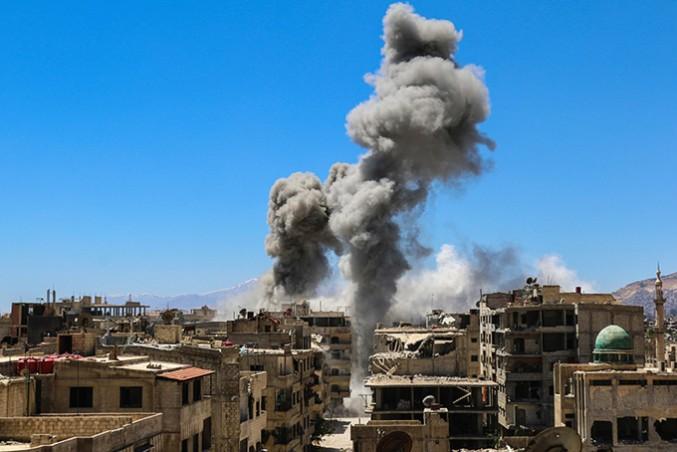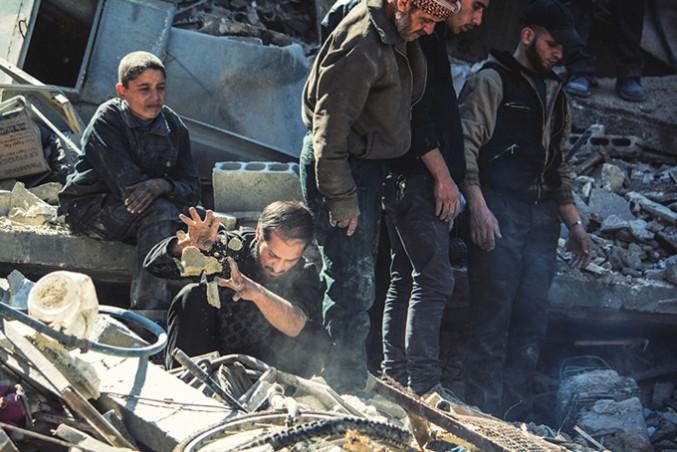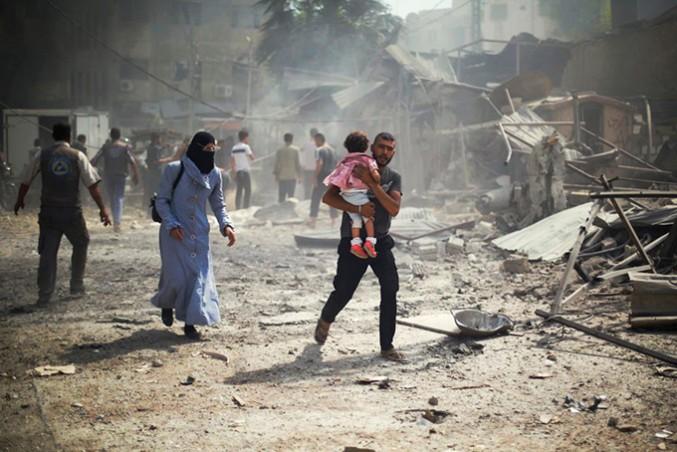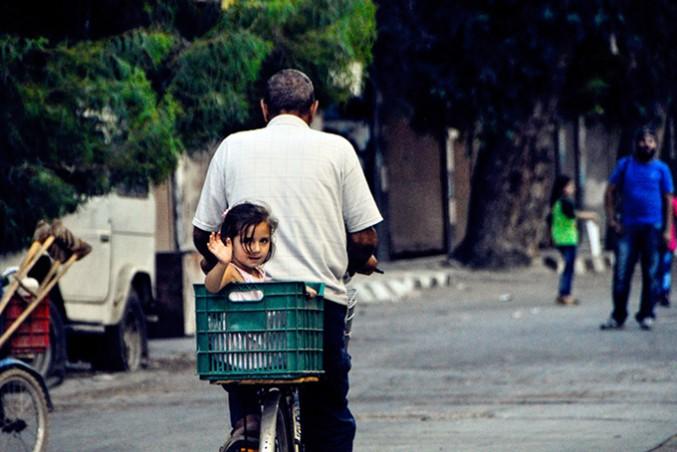By Behdad Mahichi
When Amira Abadi* made the decision to go back to Syria, her father was completely against it. Her friends were bewildered. Her workplace manager thought she was joking.
Abadi went back to Damascus to visit family last summer, amidst war.
Prior to that, she visited in 2010, before the civil war had erupted. Contrasting the two visits, Abadi says things had drastically changed — her home country had become unrecognizable.
She landed at an airport in Lebanon and took a cab ride to the Syrian border. The sun beat down on the dry land as crowds of displaced Syrians waited in despair to exit their home country. Moving past the heavily armed Lebanese officials, Abadi entered Syria.
It’s the outskirts of the country that are the most dangerous — cities like Aleppo, Idlib and Homs — all having made headlines after crumbling under artillery bombardment. Abadi’s destination was Damascus, known to be relatively calm compared to the rest of the country. Yet large areas of the capital city had been destroyed, elevated roads had collapsed to the ground, and certain neighbourhoods not far from the city centre had come under the control of ISIS.
Driving into town to visit family and friends would normally take five minutes, but with the heavy presence of checkpoints it became a 45-minute trip.
“You’ll randomly hear the sound of gunshots and missiles flying around above your head,” Abadi says. “You got to live like everyone else, you just adapt to the situation.”
Electricity blackouts, water outages, food shortages — the list goes on.
“We went back a hundred years,” she says, a common saying in Syria to describe the effects of the war.
Abadi is now finishing her last year in business administration at George Brown College and will be coming to Ryerson next year to pursue global management.
“Ever since I came back I wanted to do something about my country, I just didn’t know how,” she says.
The unrest in Syria, which first began as peaceful protests in 2011, has now grown into a deadly war that has claimed the lives of over 200,000. The UN Refugee Agency reported that the number of Syrians fleeing the country has passed 4 million.
Only later did Abadi realize she may never return to Syria. When she stumbled upon an article about Ryerson’s Lifeline Syria Challenge, she knew she had to take action in the effort to help those escaping the troubles of war.
Lifeline Syria is a Toronto-based initiative that formed in June 2015 with the goal of sponsoring and supporting 1,000 Syrian refugees within the next two years.
Its members have attended city hall meetings to discuss ways Toronto can allocate more resources to assisting newcomers and have become public advocates for greater federal response to the Syrian refugee crisis. Ratna Omidvar, chair of Lifeline Syria, is also the executive director of the Ted Rogers School of Management.
The school hopped on board with the initiative a month later, creating their own division called the Ryerson Lifeline Syria Challenge. The team plans to sponsor and aid 100 refugees, taking ownership of 10 per cent of Lifeline Syria’s current goal. Twenty-five sponsor teams have been signed — each pooling around $27,000, the estimated minimum cost to support a family for a year. More than $270,000 has been raised to date.
Abadi could no longer sit and watch — this was an opportunity for her to take action. She is now one of 270 volunteers — each with their own story — and each of whom play a role in helping Ryerson settle 100 Syrian refugees into the Greater Toronto Area.
“You’ll randomly hear the sound of gunshots and missiles flying around above your head,” Abadi says. “You got to live like everyone else, you just adapt to the situation.”
Omidvar says the inspiration to start this initiative dates back to 1979, when Canada began to send aid to those fleeing the disasters of the Vietnam War.
“Toronto has a proud history of welcoming refugees,” Omidvar says. “Why can’t we do this again?”
About 60,000 Indochinese resettled in Canada by 1980 — and 29,269 of them were sponsored through the Toronto-based refugee organization at the time, called Operation Lifeline.
Wendy Cukier, vice-president research and innovation at Ryerson who is now the executive lead of Ryerson’s Lifeline Syria, was part of the original operation back when she was a student at the University of Toronto.
“The opportunity to privately sponsor was presented, and I got a group of people together to pledge money and support a family for a year,” she says.
With the help of her roommate, she did a lot of the groundwork for the family, such as driving around to find them a suitable apartment. As a student, Cukier had more flexibility in time, though they relied on the older members of the group with more financial security for things such as signing the lease.
“When they arrived, there was a man, a woman and a cousin,” Cukier says. They spoke very little English, and they knew Vietnamese and Mandarin. Language was the biggest challenge.”
Members of the supporting group helped them enroll in ESL classes.
Cukier is still in close touch with the family and says they’ve come an incredibly long way. They had two children after arriving, a girl and a boy.
The daughter, Jennifer, is a professional in human resources, and now a mother to a baby boy. The son, Alex, now works as a radiology technician and is a newlywed.
“You see the extended family and how incredibly accomplished and successful they have all been,” she says. “Particularly the second generation.”
When President Sheldon Levy heard about Lifeline Syria’s goal, he immediately called for Ryerson to become a leader in its implementation, which gave Cukier the green light to spearhead the initiative after coordinating with Omidvar.
“This is almost a perfect case study of how Ryerson is different than other institutions both in our ability to respond quickly and to create great learning opportunities for students.”
Student volunteers like Abadi are essential in laying the groundwork for the families before they arrive. The majority of volunteers are from Ryerson, though students from other schools have joined as well. U of T, York and OCAD recently announced plans to follow Ryerson’s lead on the initiative.
They’re split into five different groups reflective of their programs and interests: health and wellness, translation, citizen engagement, finance and a “Welcome to Toronto” group.
“We want to have as many answers for the Syrian families when they arrive,” says Samantha Jackson, head volunteer coordinator and PhD candidate at Ryerson.
Commerce students are creating a handbook with information to help newcomers learn about finances in Canada, as well as locating user-friendly banks. Nursing students are looking into things like acquiring an Ontario Health Card as quickly as possible upon arrival. Political science students are creating guides on the Canadian governmental structure and the rights of a permanent resident in Canada. The “Welcome to Toronto” group will be finding ways to engage and familiarize the families with the city.
Abadi is on the finance team, and also joins more than 30 students who speak Arabic as part of the translation team.
“My goal is to do as much as I can,” she says.
Philam Nguyen, staff volunteer and research projects officer at Ryerson says that newcomers face a lot of barriers that financial support alone can’t fix — which is why the work students are doing is so important.
“Compared to other people who move to Canada on their own commission it’s obviously different,” she says.
Nguyen was 11-months-old when she came to Canada as a government-sponsored refugee from Vietnam. Her parents were some of nearly 800,000 people who fled the country by boat between the ‘70s and ‘80s, hoping to land on safer shores.
“I don’t have memory about it, but I was lucky. [The government] oversaw the sponsorship to become a citizen, but once we came here, it was places such as church groups and volunteer groups that helped us in our day-to-day.”
Lifeline Syria received an outpouring of support in early September — the catalyst being the raw and heartbreaking image of Alan Kurdi, a three-year-old Syrian boy found dead after washing ashore on a Turkish beach.
Nguyen says the image struck her emotionally. She and her family witnessed a similar and equally horrific incident while fleeing Vietnam, as recounted to her by her father.
“The boat that I was on, there was 175 people — it wasn’t a very big boat,” Ngyuen says. “When a Norwegian tank liner was coming to pick us up, there was this father that was a little bit eager to kind of get on and tried to get in front. When the two boats came together he fell into the water with his two children, who drowned.”
There are similarities between today and the refugee crisis in the 1980s, Nguyen says.
A low acceptance rate of Syrian refugees around the world can be linked to a fear of national security threatened by terrorists — much as the West feared communist infiltrators after the Vietnam War.
Amidst pressure, Immigration Minister Chris Alexander recently announced Canada will be accepting 10,000 Syrian refugees by September 2016, which is 15 months earlier than originally promised. Ontario Premier Kathleen Wynne also recently allocated $10.5 million to help expedite the resettlement.
At Ryerson, Cukier says they’re unsure when exactly the families will arrive — it’s estimated to take between eight and 12 months. Others say it could be as early as February.
“It’s tough to tell all our incredibly driven volunteers, who want to get this going, that people might not arrive for another 12 months,” Jackson says.
“It’s tough to tell all our incredibly driven volunteers, who want to get this going, that people might not arrive for another 12 months,” Jackson says.
Refugees will be selected in three different ways. Those already in Canada have the opportunity to identify friends or family for resettlement. Ryerson will then check with groups such as churches that arrange resettlement missions. Cases can also be referred to by the UN Refugee Agency or the federal government.
Martin Mark, director of the Office for Refugees at the Archdiocese of Toronto has agreed to identify a number of families to Ryerson when he visits refugee camps in Jordan this October.
“I don’t think anybody knows that my small office in Scarborough is resettling like 750 refugees each year,” he says.
Mark will be going to Jordan with seven volunteers on behalf of Catholics Without Borders, though being Catholic is not a requirement.
“There are Muslims and Baha’is as far as I know. We don’t ask about religion.”
That applies to refugees as well, he says.
Ahead of going to the Middle East, his office is helping many individuals use the church’s reunification program.
“Just today, 150 people came to my office — all of them who had relatives, colleagues, neighbours — all of who are in refugee-like situations. So then, we train these people on how to do this process, and then they can do it in our name.”
While in Jordan, Mark will be visiting refugee camps and conducting interviews. He notes that the Canadian embassy in the capital city of Amman is one of the fastest in the world when it comes to processing applications.
Until then, volunteers like Abadi continue to patiently wait and make preparations for the families ahead of their arrival.
“It’s so sad to see what it’s gotten to,” she says. “Slowly, everyone’s just leaving.”
Abadi pictures a bright future for the country, but says it won’t come any time soon. She looks forward to the day the sponsored families get here, and will pass on a simple message upon their arrival.
“Welcome home.”
*Some names have been changed to protect anonymity













Leave a Reply